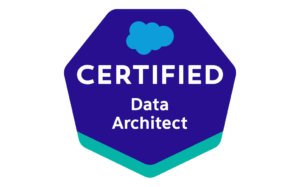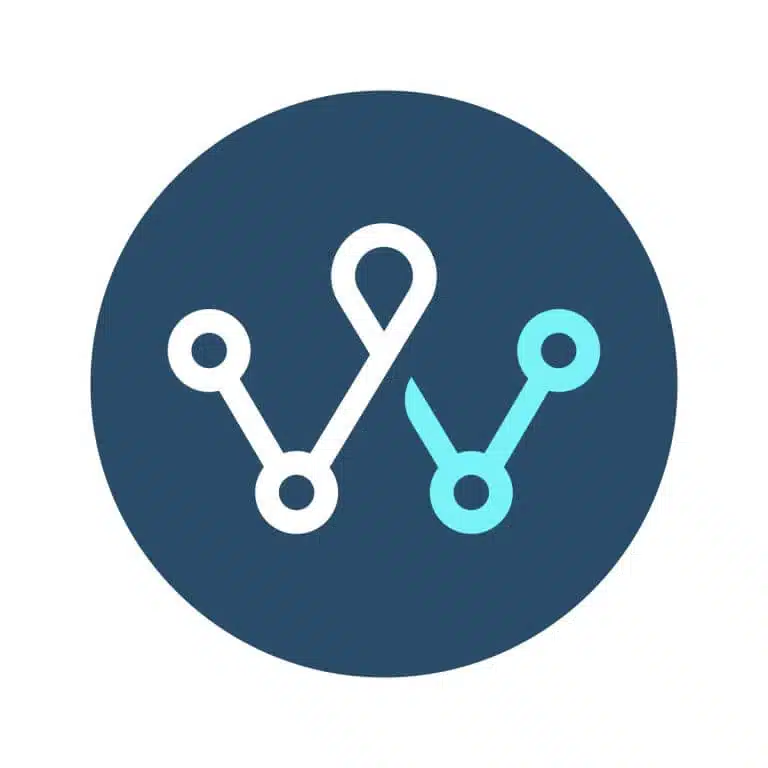In the financial services industry, effective client management and streamlined operations are critical for success. With increasing regulatory requirements and a highly competitive market, financial institutions must prioritize building and maintaining strong client relationships. This is where Customer Relationship Management (CRM) systems come into play.
CRMs are more than just tools for storing customer information; they offer comprehensive solutions that enhance client engagement, support compliance efforts, and optimize business processes. For financial services providers, the right CRM can lead to improved customer loyalty, greater operational efficiency, and a significant competitive advantage.
Key features to look for in a finance CRM include:
- Client Data Management: Centralized storage of client information, including transaction history and communication records.
- Compliance and Security: Tools to ensure adherence to regulatory requirements and protect sensitive data.
- Financial Planning and Advisory Tools: Features that support financial advisors in creating and managing client portfolios.
- Automation and Workflow Management: Automation of routine tasks, such as data entry and reporting, to improve efficiency.
- Analytics and Reporting: Advanced analytics to gain insights into client behavior and business performance.
- Integration Capabilities: Ability to integrate with other financial software and systems for a seamless workflow.
In this article, we explore the top CRM systems tailored for the financial services sector. These platforms offer these essential features and more, enabling firms to enhance their customer interactions and drive better business outcomes.
With insights from WayPath, a leader in CRM implementation and optimization for financial services, we will guide you through selecting the ideal CRM solution for your firm. Whether you’re a bank, insurance company, wealth management firm, or another financial institution, a well-chosen CRM can transform your customer interactions and business operations.
Top Finance CRMs for Financial Services
1. Salesforce Financial Services Cloud
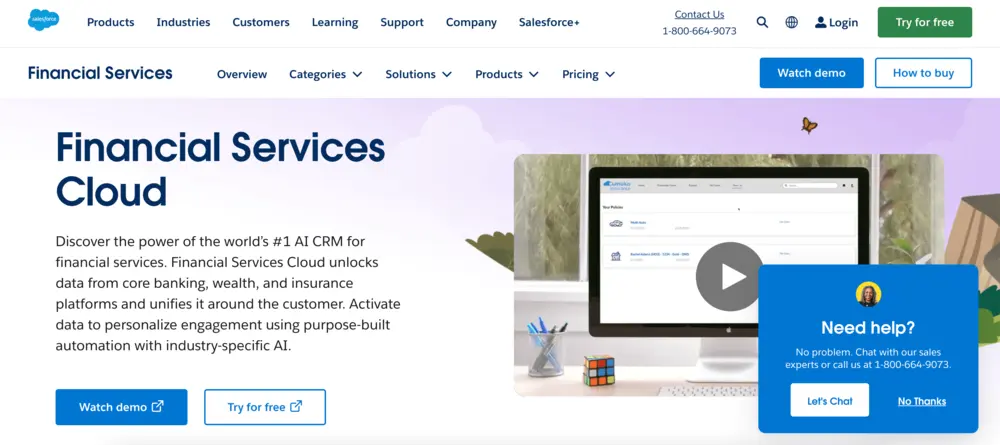
Overview
Salesforce Financial Services Cloud is a specialized version of Salesforce CRM tailored to the needs of financial services firms. It offers a comprehensive set of tools for managing client relationships, compliance, and financial planning.
Key Features
- Client Data Management: Provides a 360-degree view of client information, including financial accounts, interactions, and life events.
- Compliance Management: Features to help ensure adherence to industry regulations and secure sensitive client data.
- Financial Planning and Advisory Tools: Supports financial advisors in creating personalized financial plans and tracking client goals.
- Automation and Workflow Management: Automates routine tasks, such as document processing and client follow-ups.
- Analytics and Reporting: Advanced analytics and customizable reports for insights into client behavior and business performance.
Benefits for Financial Services Providers
- Enhanced client engagement and satisfaction through personalized services.
- Improved efficiency and accuracy in managing client data and interactions.
- Stronger compliance with industry regulations.
WayPath Consulting’s Expertise
WayPath specializes in the implementation and optimization of Salesforce Financial Services Cloud. With extensive experience in the financial services sector, WayPath can help your firm customize and integrate Salesforce to meet specific business needs. Our team provides comprehensive support, from initial setup to ongoing management, ensuring you maximize the platform’s capabilities to drive business growth and enhance client relationships.
2. Microsoft Dynamics 365 Finance and Operations
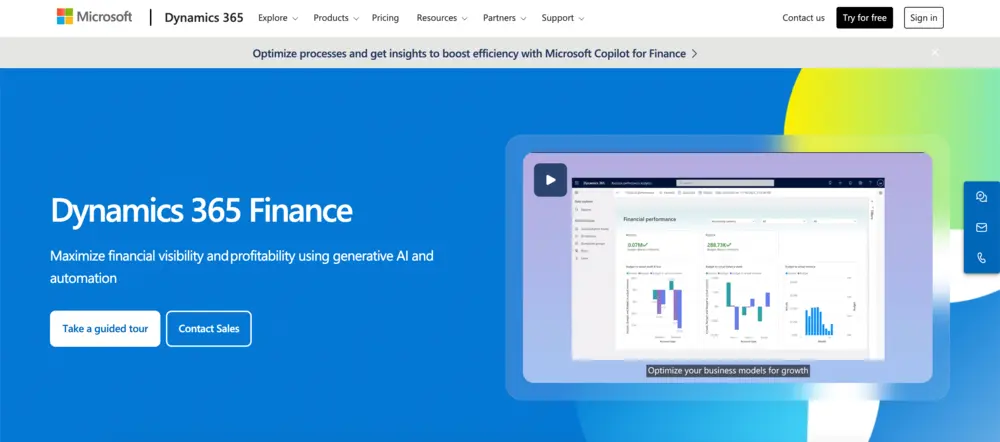
Overview
Microsoft Dynamics 365 Finance and Operations is a versatile CRM and ERP solution designed to streamline financial processes and improve client relationships. It offers deep integration capabilities and advanced analytics.
Key Features
- Unified Client and Financial Data: Integrates client relationship management with financial operations for a holistic view.
- Financial Reporting and Compliance: Tools for financial reporting, budgeting, and ensuring compliance with regulatory requirements.
- Process Automation: Automates financial workflows, such as billing and reporting, to improve efficiency.
- Analytics and AI: Uses AI-driven insights to identify trends and opportunities in financial services.
Benefits for Financial Services Providers
- Streamlined financial operations and improved decision-making.
- Enhanced client experience through integrated financial services.
- Scalability to support growing financial institutions.
3. Zoho CRM for Finance
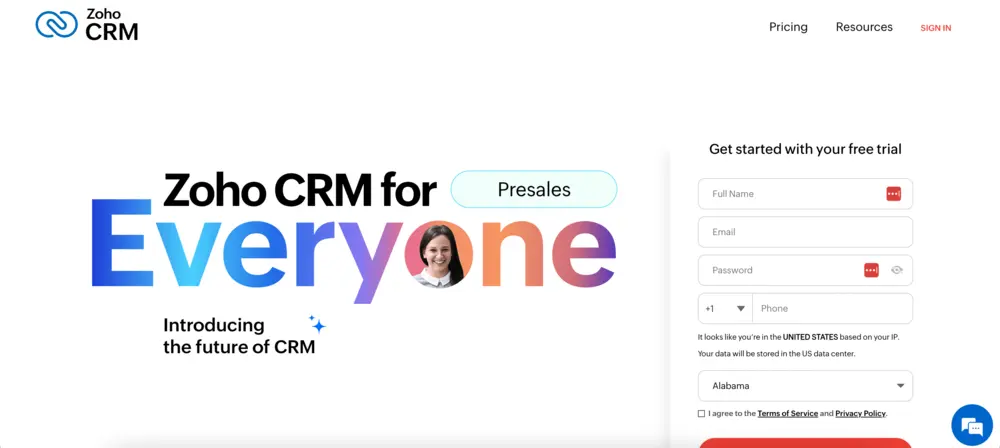
Overview
Zoho CRM offers a cost-effective and highly customizable solution for financial services providers. It caters to small and medium-sized firms looking for a versatile CRM platform to manage client interactions and streamline operations.
Key Features
- Client Management: Centralizes client data, including contact information, transaction history, and communication records.
- Lead and Deal Management: Tools for tracking potential clients and managing sales pipelines.
- Workflow Automation: Automates repetitive tasks like email follow-ups and data entry, saving time and reducing errors.
- Analytics and Reporting: Provides insights into sales performance and client behavior through customizable reports.
- Integration Capabilities: Easily integrates with other Zoho products and third-party applications, including financial software.
Benefits for Financial Services Providers
- Affordable pricing with flexible customization options.
- Streamlined client management and improved sales processes.
- Enhanced decision-making through detailed analytics.
4. HubSpot CRM for Financial Services
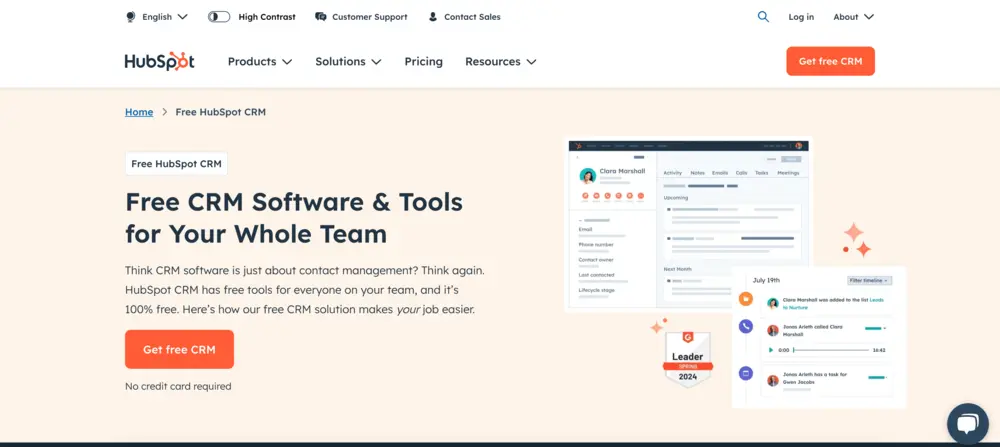
Overview
HubSpot CRM is known for its user-friendly interface and robust marketing automation features. It is ideal for financial services firms looking to enhance client engagement and streamline their marketing efforts.
Key Features
- Contact and Client Management: Maintains detailed records of client interactions, preferences, and financial needs.
- Marketing Automation: Tools for email marketing, social media campaigns, and content management.
- Sales Automation: Automates sales processes, including lead nurturing, follow-ups, and task management.
- Analytics and Dashboards: Real-time analytics and customizable dashboards for tracking marketing and sales performance.
- Integration Capabilities: Integrates with various financial tools and services, providing a seamless workflow.
Benefits for Financial Services Providers
- Enhanced client engagement through targeted marketing and personalized communication.
- Improved efficiency in sales and marketing processes.
- Comprehensive analytics for data-driven decision-making.
5. Pega CRM for Financial Services
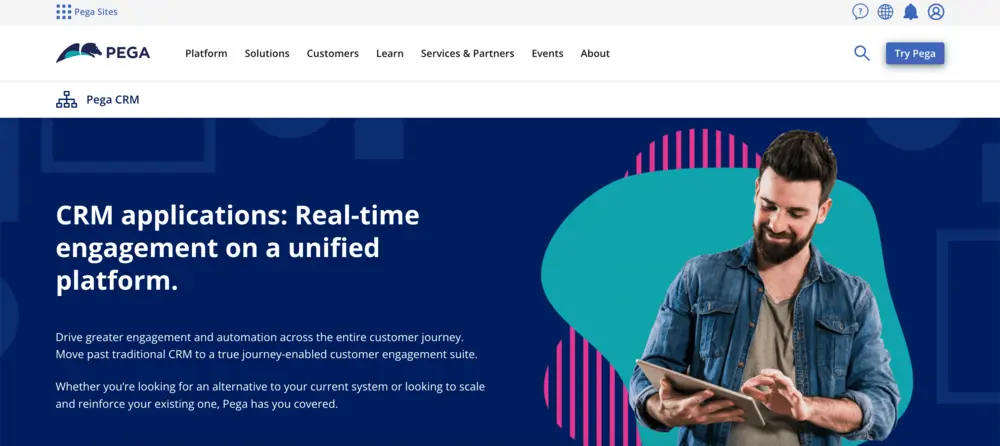
Overview
Pega CRM offers a robust platform designed for financial services, with a focus on automation and AI-driven insights. It is suitable for larger firms looking to enhance customer service and operational efficiency.
Key Features
- AI and Automation: Uses AI to automate workflows and provide actionable insights for improving client services.
- Case Management: Manages complex client cases, ensuring timely follow-ups and resolutions.
- Personalized Client Engagement: Customizes client interactions based on their profiles and preferences.
- Compliance and Risk Management: Features to help ensure compliance with industry regulations and manage risk.
- Integration and Scalability: Integrates with existing systems and scales as your business grows.
Benefits for Financial Services Providers
- Enhanced customer service through efficient case management and personalized interactions.
- Reduced operational costs and improved accuracy through automation.
- Strong compliance and risk management features.
6. Oracle CRM for Financial Services
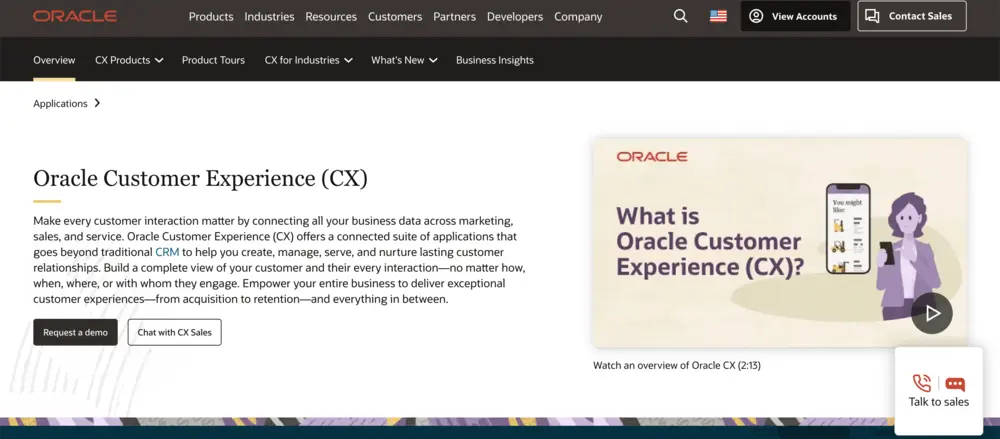
Overview
Oracle CRM for Financial Services offers a comprehensive suite of tools tailored for large financial institutions. It combines CRM with advanced analytics and robust security features.
Key Features
- Client and Account Management: Centralized system for managing client data and financial accounts.
- Advanced Analytics: Predictive analytics and machine learning for deeper insights into client behavior and market trends.
- Security and Compliance: High-level security features to protect sensitive data and ensure compliance with regulations.
- Omnichannel Communication: Supports multiple communication channels, including email, phone, and online portals.
- Integration with Oracle Ecosystem: Seamlessly integrates with other Oracle products and financial systems.
Benefits for Financial Services Providers
- Improved decision-making through advanced analytics and data insights.
- Enhanced security and compliance with industry standards.
- Comprehensive client management capabilities for large-scale operations.
7. Wealthbox CRM
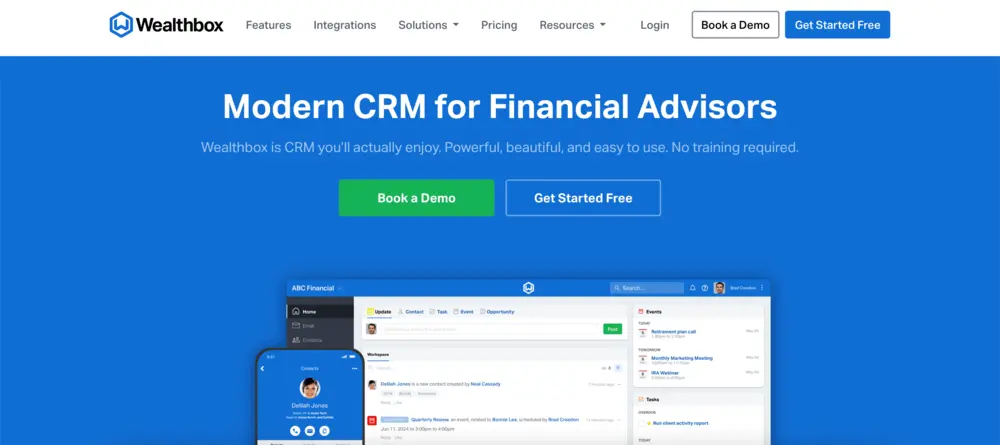
Overview
Wealthbox CRM is designed specifically for financial advisors and wealth management firms. It offers a simple yet powerful platform for managing client relationships and streamlining advisory workflows.
Key Features
- Client Management: Comprehensive client profiles, including financial details and communication history.
- Task and Workflow Management: Tools for managing tasks, workflows, and client follow-ups.
- Collaboration Tools: Features for team collaboration, including shared calendars and notes.
- Integration with Financial Tools: Integrates with popular financial planning tools and third-party applications.
- User-Friendly Interface: Intuitive design for easy adoption by financial advisors and their teams.
Benefits for Financial Services Providers
- Streamlined client management and efficient workflow organization.
- Improved collaboration within advisory teams.
- Easy integration with financial planning tools for a seamless advisory experience.
Choosing the Right CRM for Your Financial Services Firm
Selecting the appropriate CRM for your financial services firm involves several critical considerations to ensure the chosen platform aligns with your business needs and goals. Here are key factors to consider:
- Firm Size and Scope: Assess whether the CRM can scale with your business, handling an increasing volume of clients and data as your firm grows.
- Specific Needs and Features: Identify the specific features your firm requires, such as compliance management, financial planning tools, or advanced analytics. Choose a CRM that offers these features out-of-the-box or allows for easy customization.
- Integration Capabilities: Ensure the CRM can integrate seamlessly with your existing systems, such as accounting software, financial planning tools, and other business applications. This integration is crucial for maintaining a smooth workflow and data consistency.
- User Experience and Adoption: Consider the ease of use of the CRM platform. A user-friendly interface and intuitive features are essential for ensuring high adoption rates among your staff.
- Compliance and Security: Given the sensitive nature of financial data, prioritize CRMs with robust security measures and compliance features. Ensure the platform complies with relevant regulations, such as GDPR, FINRA, or others applicable in your jurisdiction.
- Cost and Budget: Evaluate the total cost of ownership, including licensing fees, implementation costs, training, and ongoing maintenance. Choose a CRM that fits within your budget while offering the necessary features.
- Support and Training: Look for CRMs that offer strong customer support and training resources. This support is crucial for a smooth implementation and to resolve any issues that may arise.
By carefully evaluating these factors, you can select a CRM that not only meets your current needs but also adapts to future requirements as your firm grows and evolves.
How WayPath Consulting Can Help
WayPath is a trusted partner for financial services firms seeking to implement or optimize CRM systems. With extensive experience in the financial services sector, WayPath offers comprehensive services to ensure your CRM solution delivers maximum value.
Our Services Include:
- Consultation and Needs Assessment: We collaborate with your team to understand your specific requirements and challenges, providing tailored recommendations for the best CRM solutions.
- Implementation and Integration: Our experts manage the entire implementation process, ensuring seamless integration with your existing systems and minimal disruption to your operations.
- Customization and Optimization: We customize the CRM platform to meet your unique needs, from configuring workflows and data fields to developing custom reports and dashboards.
- Training and Support: WayPath provides comprehensive training to ensure your staff can effectively use the CRM, along with ongoing support to address any issues that may arise.
- Continuous Improvement: Our team monitors the performance of your CRM and recommends improvements to enhance functionality and user experience.
Get Started with WayPath Consulting
If you’re ready to transform your financial services operations with a top-tier CRM, WayPath is here to help. Contact us today to schedule a consultation and discover how we can support your journey toward better client management and business efficiency.
In the dynamic and highly regulated financial services industry, a robust CRM system is crucial for managing client relationships, streamlining operations, and ensuring compliance. Whether you choose Salesforce Financial Services Cloud, Microsoft Dynamics 365, or another leading platform, the right CRM can significantly enhance your firm’s efficiency and client satisfaction.
With the expertise of WayPath, financial services firms can confidently select and implement a CRM solution that not only meets their current needs but also supports future growth. By leveraging advanced features and customization options, your firm can stay competitive, improve client experiences, and achieve long-term success.
Frequently Asked Questions
What is a CRM in finance?
A CRM (Customer Relationship Management) system in finance is a software platform that helps financial institutions manage client relationships, streamline operations, and ensure compliance. It centralizes client information, automates tasks, and provides analytics to improve customer service and operational efficiency.
What is the best CRM for financial services?
The best CRM for financial services depends on the specific needs of the firm. Popular options include Salesforce Financial Services Cloud, Microsoft Dynamics 365 Finance and Operations, and Wealthbox CRM. These platforms offer features like client data management, compliance tools, and financial planning support, catering to different types of financial institutions.
What is CRM in Fintech?
In Fintech, CRM systems help companies manage customer relationships, enhance customer experiences, and streamline financial services. They often include features like digital onboarding, automated customer support, and personalized financial advice, integrating seamlessly with digital banking and payment platforms.
What do banks use for CRM?
Banks use CRM systems to manage customer data, track interactions, and offer personalized services. Popular CRM platforms used by banks include Salesforce Financial Services Cloud, Microsoft Dynamics 365, and Oracle CRM. These systems help banks improve customer service, enhance compliance, and optimize marketing efforts.
What does CRM stand for?
CRM stands for Customer Relationship Management. It refers to the practices, strategies, and technologies used by companies to manage and analyze customer interactions and data throughout the customer lifecycle.
What does CRM mean in accounting?
In accounting, CRM refers to the use of a system to manage interactions with clients and streamline accounting processes. It includes features like billing and invoicing, tracking client interactions, and managing financial data, helping accountants and financial advisors maintain accurate records and provide personalized services.


